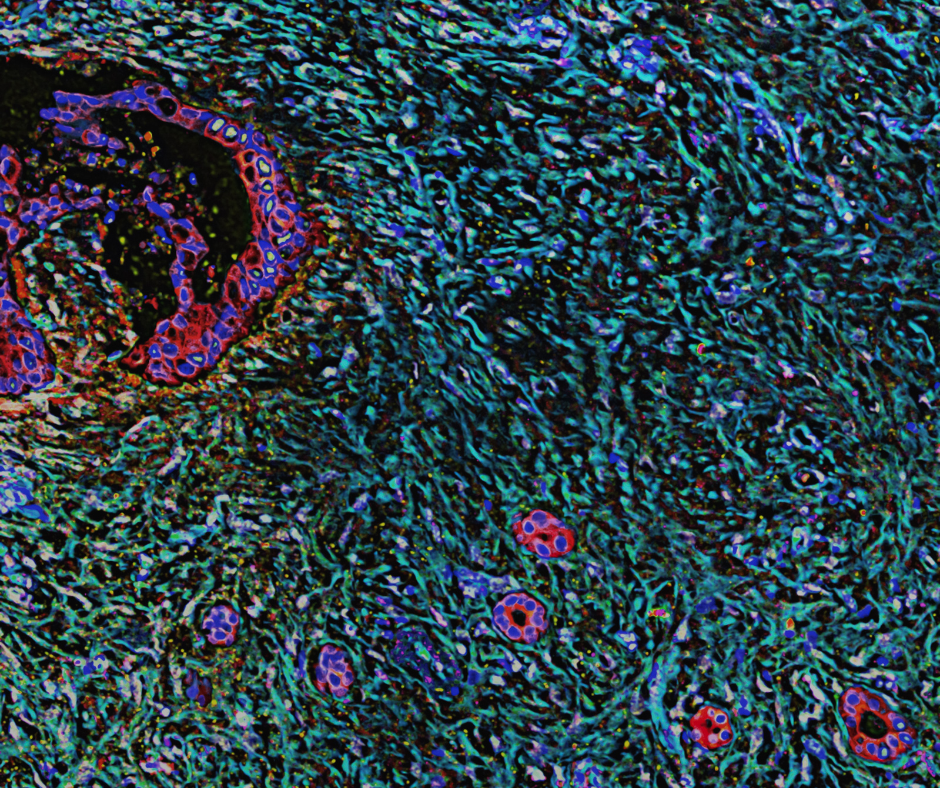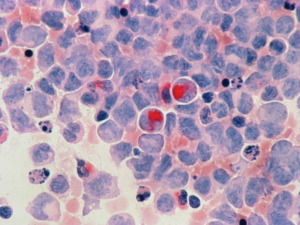Amanda Y. Tam, MS, FNP-BC
The standard of care with curative intent for resectable or borderline resectable pancreatic adenocarcinoma involves surgery and then adjuvant chemotherapy.
High-risk features include the following:
- markedly elevated CA 19-9
- large primary tumors
- large regional lymph nodes
- extreme pain
- excessive weight loss
For these patients, the National Comprehensive Cancer Network (NCCN®) guidelines recommend considering neoadjuvant therapy.1
The NCCN guidelines note, “there is limited evidence to recommend specific neoadjuvant regimens off-study, and practices vary with regard to the use of chemotherapy and chemoradiation. Most NCCN Member institutions prefer neoadjuvant therapy at or coordinated through a high-volume center.” Given the constant quest for improving methods, treatments, and ultimately overall survival (OS) for patients with this lethal disease, it is recommended for patients to embark on treatment in a clinical trial appropriate for the stage/clinical situation of the patient.
In the past several years, practice-changing data has been shaping the landscape of chemotherapy in terms of preferred regimen(s), timing (neoadjuvant, perioperative or adjuvant), and whether or not to offer radiation with chemotherapy (concurrently or in sequence).
PRODIGE 24
The randomized phase 3 PRODIGE 24 clinical trial outlined the use of 6 months of adjuvant chemotherapy, comparing modified 5-fluorouracil with leucovorin, irinotecan, and oxaliplatin (mFOLFIRINOX) to single-agent gemcitabine. The final 5-year results indicated that adjuvant treatment with mFOLFIRINOX yielded significantly longer survival than gemcitabine in patients with resected pancreatic ductal adenocarcinoma (median cancer-specific survival was 54.7 months in mFOLFIRINOX group vs 36.3 months in gemcitabine group).2
While the PRODIGE 24 trial showed good results with adjuvant mFOLFIRINOX, there are still concerns that there will be a portion of patients not able to proceed with adjuvant chemotherapy post-pancreatic surgery due to the development of postoperative complications or need for extended recovery time; or they will develop relapse, intolerable side effects, or metastatic disease during the adjuvant course.
More providers/institutions are now adopting the approach of offering neoadjuvant therapy to be able to allow for more optimal treatment, including:
- treatment of micrometastases occult to imaging prior to surgery,
- early identification of patients with aggressive tumor biology—thus sparing them from a major abdominal surgery,
- and possibly reduction of tumor size and vascular involvement to increase the likelihood of a microscopically radical resection.3
Alliance A021501
The randomized phase 2 Alliance A021501 clinical trial investigated the efficacy of preoperative mFOLFIRINOX vs mFOLFIRINOX followed by hypofractionated radiation for borderline resectable pancreatic adenocarcinoma. Patients who received neoadjuvant mFOLFIRINOX had an 18-month OS rate of 66.7%, which was better than historical data (50%), while patients who received mFOLFIRINOX followed by radiation had an OS rate of 47.3%. This trial established mFOLFIRINOX as a preferred neoadjuvant treatment regimen. This trial was not set up to compare chemotherapy with chemotherapy and radiotherapy in the neoadjuvant setting so the role of radiotherapy in this setting remains undefined.4
SWOG S1505
The randomized phase 2 SWOG S1505 clinical trial compared perioperative regimens of mFOLFIRINOX with gemcitabine and nab-paclitaxel. This study did not show that one preoperative regimen was better than the other in resectable pancreatic adenocarcinoma. Neither regimen’s 2-year OS estimate was statistically significantly higher than the historical threshold.5
Ongoing trials: PREOPANC-2 and Alliance A021806
Ongoing studies will continue to contribute to the discussions of approaches to pancreatic adenocarcinoma treatment. Two of these trials are the PREOPANC-2 trial (Total Neoadjuvant FOLFIRINOX vs Neoadjuvant Gemcitabine-based Chemoradiotherapy and Adjuvant Gemcitabine for Resectable and Borderline Resectable Pancreatic Cancer)7 and the Alliance A021806 trial (Perioperative vs. Adjuvant Chemotherapy for Resectable Pancreatic Cancer [utilizing mFOLFIRINOX], ClinicalTrials.gov Identifier: NCT04340141).
Multidisciplinary Team for Comprehensive Care
Throughout the diagnosis and treatment journey of patients with non-metastatic pancreatic adenocarcinoma, we feel it’s important to involve a multidisciplinary team for comprehensive care. This multidisciplinary team may include providers from diagnostic imaging, interventional endoscopy, medical oncology, radiation oncology, surgery, pathology, geriatric medicine (if applicable), genetic counseling, palliative medicine, and nutrition.
As with all patients with newly diagnosed pancreatic adenocarcinoma, referral to genetic counseling and germline testing utilizing comprehensive gene panels for hereditary cancer syndromes is highly recommended. Recent evidence suggests that 10% of patients, regardless of family history, harbor germline mutations. Germline testing may also have therapeutic implications (eg, BRCA1 or BRCA2 germline mutations).6
While patients are undergoing their pancreatic cancer treatments, whether in the metastatic or non-metastatic setting, their symptom/side effect profiles and nutritional needs will change throughout the course of their journeys. It is vital for palliative medicine involvement and registered dietician consultations. Having optimal symptom management and nutrition status will boost patients’ abilities to tolerate oncologic treatment which hopefully will translate to improved outcomes.
Our Approach
Taking into consideration the available trial data including the small sampling above, our institutional preference for all patients with newly diagnosed non-metastatic pancreatic adenocarcinoma is to offer neoadjuvant chemotherapy with mFOLFIRINOX. If patients are of advanced physiological age with significant comorbidities or with decreased performance status, we will try our utmost to adjust the mFOLFIRINOX regimen and supportive care to increase patient tolerability. Modifications to the mFOLFIRINOX regimen may include, but are not limited to, dose reductions or starting with a doublet regimen (eg, FOLFOX), then titrating up to the triplet mFOLFIRINOX regimen as tolerated.
If patients still have difficulty tolerating mFOLFIRINOX with multiple adjustments/reducing number of agents, then we may consider gemcitabine/nab-paclitaxel, or gemcitabine alone.
A brief mention of our approach in the postoperative period: For patients who have recovered adequately from surgery, we would offer adjuvant therapy ideally within 12 weeks of surgery to complete a total of 6 months of perioperative therapy. The choice of adjuvant therapy would depend on the response to neoadjuvant therapy and other clinical considerations. Should there be a positive margin on the surgical pathology, we would consider including radiotherapy in the adjuvant course given this high-risk feature.

References
- National Comprehensive Cancer Network (NCCN). NCCN Clinical Practice Guidelines in Oncology, Pancreatic Adenocarcinoma Version 2.2022. Available at: https://www.nccn.org/professionals/physician_gls/pdf/pancreatic.pdf
Accessed December 29, 2022. - Conroy, T., Castan, F., Lopez, A., Turpin, A., Ben Abdelghani, M., Wei, A. C., Mitry, E., Biagi, J. J., Evesque, L., Artru, P., Lecomte, T., Assenat, E., Bauguion, L., Ychou, M., Bouché, O., Monard, L., Lambert, A., Hammel, P., & Canadian Cancer Trials Group and the Unicancer-GI–PRODIGE Group (2022). Five-Year Outcomes of FOLFIRINOX vs Gemcitabine as Adjuvant Therapy for Pancreatic Cancer: A Randomized Clinical Trial. JAMA oncology, 8(11), 1571–1578.
- Perri, G., Marchegiani, G., Malleo, G., & Salvia, R. (2021). Neoadjuvant therapy in resectable pancreatic cancer-is this the way forward?-a narrative review. Chinese clinical oncology, 10(5), 47.
- Katz, M. H. G., Shi, Q., Meyers, J., Herman, J. M., Chuong, M., Wolpin, B. M., Ahmad, S., Marsh, R., Schwartz, L., Behr, S., Frankel, W. L., Collisson, E., Leenstra, J., Williams, T. M., Vaccaro, G., Venook, A., Meyerhardt, J. A., & O’Reilly, E. M. (2022). Efficacy of Preoperative mFOLFIRINOX vs mFOLFIRINOX Plus Hypofractionated Radiotherapy for Borderline Resectable Adenocarcinoma of the Pancreas: The A021501 Phase 2 Randomized Clinical Trial. JAMA oncology, 8(9), 1263–1270.
- Ahmad, S. A., Duong, M., Sohal, D. P. S., Gandhi, N. S., Beg, M. S., Wang-Gillam, A., Wade, J. L., 3rd, Chiorean, E. G., Guthrie, K. A., Lowy, A. M., Philip, P. A., & Hochster, H. S. (2020). Surgical Outcome Results From SWOG S1505: A Randomized Clinical Trial of mFOLFIRINOX Versus Gemcitabine/Nab-paclitaxel for Perioperative Treatment of Resectable Pancreatic Ductal Adenocarcinoma. Annals of surgery, 272(3), 481–486.
- Golan, T., Hammel, P., Reni, M., Van Cutsem, E., Macarulla, T., Hall, M. J., Park, J. O., Hochhauser, D., Arnold, D., Oh, D. Y., Reinacher-Schick, A., Tortora, G., Algül, H., O’Reilly, E. M., McGuinness, D., Cui, K. Y., Schlienger, K., Locker, G. Y., & Kindler, H. L. (2019). Maintenance Olaparib for Germline BRCA-Mutated Metastatic Pancreatic Cancer. The New England journal of medicine, 381(4), 317–327.
- Janssen, Q. P., van Dam, J. L., Bonsing, B. A., Bos, H., Bosscha, K. P., Coene, P. P. L. O., van Eijck, C. H. J., de Hingh, I. H. J. T., Karsten, T. M., van der Kolk, M. B., Patijn, G. A., Liem, M. S. L., van Santvoort, H. C., Loosveld, O. J. L., de Vos-Geelen, J., Zonderhuis, B. M., Homs, M. Y. V., van Tienhoven, G., Besselink, M. G., Wilmink, J. W., … Dutch Pancreatic Cancer Group (2021). Total neoadjuvant FOLFIRINOX versus neoadjuvant gemcitabine-based chemoradiotherapy and adjuvant gemcitabine for resectable and borderline resectable pancreatic cancer (PREOPANC-2 trial): study protocol for a nationwide multicenter randomized controlled trial. BMC cancer, 21(1), 300. https://doi.org/10.1186/s12885-021-08031-z







